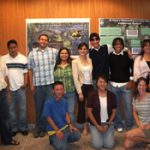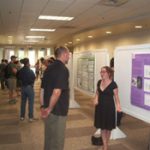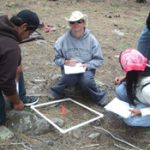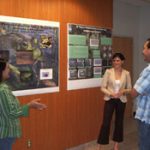Research Experience for Undergraduates in Environmental Sciences: Ecology, Genetics, and Adaptation on the Colorado Plateau is an intensive 10-week research experience that take place each summer and is designed to introduce students to the world of scientific research. This Northern Arizona University (NAU) program is funded by the National Science Foundation Research Experiences for Undergraduates (REU) program.
Students are selected for the program on the basis of the following criteria: satisfactory performance in at least one science course, lack of access to research opportunities, attendance at a Tribal or community college, interest in pursuing a scientific career, alignment of student and mentor interests, match with program goals, and overall academic performance and potential.
The program begins with a weeklong course on the conduct of research in environmental sciences at the Merriam Powell Research Station, which is housed on the grounds of The Arboretum at Flagstaff. The arboretum is 5 miles from Flagstaff, Arizona, and surrounded by ponderosa pine forest.
Following this experience, students are ready to return to the NAU campus and spend nine weeks working with a faculty or graduate student mentor on an independent research project matching their interests.
The on-campus portion of the program includes: (1) seminars on career options, research skills development, and Native American and western science perspectives; (2) individual consultation on research paper and poster presentation development; and (3) social activities.
The program offers (1) a $700 per week stipend, (2) partial food and travel reimbursements, and (3) housing.
Program elements
During the first week of the program, participants conduct field work at The Arboretum at Flagstaff designed to give them hands-on experience conducting a scientific investigation. As a group, participants will develop hypotheses, design experiments, collect data, and report results. Although this field work experience may not directly relate to a participant’s individual research project, it serves as a “training ground” for the rigors of developing a hypothesis, gathering data, and communicating results.
During the final nine weeks of the program, participants have the opportunity to gain research experience. This portion of the program blends learning science and developing job skills. Participants will work under the guidance of a faculty mentor and experienced students. The goal is to expose program participants to the rigors of working in a research group in a format that teaches them the skills they will need to succeed. The daily schedule depends on the type of research project the student selects and may range from making observations using a microscope or mapping trees outdoors to analyzing data or writing up research results.
The program includes a Tuesday evening class that primarily focuses on communicating research results. Participants will be given weekly writing assignments designed to help them develop their science writing skills. The class will focus on individual sections of a standard science paper beginning with the “Introduction” and moving through the “Methods,” “Results,” and “Discussion” sections. During the final two weeks of class, participants will learn the key elements required to create a good scientific research poster, including design, readability, and research content. Finally, guest speakers will talk about career options, scholarship opportunities, and graduate and undergraduate research.
Mentors and projects
Dr. Antoninka works on the interactions between above and belowground communities and ecosystem function. In NAU’s Applied Soil Ecology Lab, Dr. Antoninka uses experiments to inform restoration of ecosystem function using plants, soils and soil biota. Lab members work across the west from deserts to forests, with topics focused on understanding the roles of soil organisms (e.g., biocrusts, mycorrhizal fungi, soil invertebrates) in restoring degraded landscapes. Biocrusts are communities of lichen, cyanobacteria and mosses that live in the top millimeters of the soil, performing every major ecosystem function. Mycorrhizal fungi are symbiotic fungi that associate with most plants, exchanging soil nutrients for fixed carbon. The focal soil invertebrates are nematodes, collembola and mites, all of which are incredibly important in nutrient cycling. The lab does experiments in the field, greenhouse and lab.
Dr. Best and students in her lab investigate the evolutionary origins of trait diversity and the consequences of that diversity for ecosystem function. Her research projects make use of the steep elevational gradients created by the Colorado Plateau, and focus on understanding (a) which aquatic species will persist in warmer waters with less predictable hydroperiods, and (b) which populations of riparian trees (e.g., from warmer vs. cooler locations) will continue to provide habitat structure. Graduate students and undergraduate students have been involved in both of these projects, with the opportunity to sample community composition in the field, quantify species and trait diversity in the lab, and learn through regular lab meetings how to organize, analyze, and present data that answer key questions.
Dr. Butterfield studies the causes and consequences of biodiversity, with an eye toward sustainable natural resource management. His lab focuses on how the physical environment, interactions among species, and management impact plant populations and communities, and the effects of those communities on the ecosystem services that we humans derive from nature. Current research projects include restoration of degraded rangelands and the dynamics of riparian ecosystems in relation to altered streamflow patterns and climate change. REU students will have the opportunity to work on a greenhouse experiment manipulating flooding and drought to better understand riparian plant responses to streamflows along the Colorado River in the Grand Canyon. Skills development will include experimental design, data collection and management, plant physiology measurements, and some statistical analysis.
Dr. Mariah Carbone studies terrestrial carbon cycling and global change. This entails understanding where carbon goes in plants and soils after being photosynthesized from the atmosphere, and what physical and biological mechanisms are involved. We measure carbon pools and fluxes, and use isotopes (mainly radiocarbon; 14C) to understand the source of the carbon or how fast/slow it is cycling. REU students will have the opportunity to conduct field research in the mountains near Crested Butte, Colorado, as well as be involved in laboratory and computer-based work at NAU. More information can be found here: Carbone Lab and Rocky Mountain Biological Laboratory.
Dr. Jeff Foster works primarily on infectious diseases of wildlife and will be sampling bats and cave habitat in northern Arizona for the presence of the fungus that causes the disease White-Nose Syndrome. In addition, his lab tests these samples using qPCR to assess the presence of the fungal pathogen. Work is expected to be largely lab-based in the Pathogen and Microbiome Institute but with some opportunities for fieldwork. Visit Foster Lab
Dr. Gehring and Dr. Whipple study plant- and soil-associated fungi in the context of environmental issues such as climate change, problematic non-native plant species such as cheatgrass and tamarisk, and altered fire regimes. Their research involves basic scientific studies of these environmental issues as well as the study of strategies for restoring damaged environments. New research projects will include plant and fungal reciprocal transplants along an elevational gradient. REU students have the opportunity to learn techniques used in both plant and fungal ecology including data collection associated with field experiments, set up and harvest of greenhouse experiments, and microscopic and molecular analyses of plant and soil associated fungi. An existing common garden provide ample opportunity for students to assess how plant traits and fungi vary across genotypes with measures that they can conduct over the summer.
Dr. Haubensak’s is a field ecologist who works at the interface of communities and ecosystems, examining plant-soil interactions in the context of restoration, biological invasions, and climate change. Her lab studies interactions and feedbacks among soil and plants to understand how terrestrial ecosystems respond to global change across a range of systems. REU students will have the opportunity to be involved in a sagebrush restoration project, examining how plant-plant interactions can change patterns of local adaptation, and challenging the notion that “local is best” in restoration. A second potential project involves the study of native pollinator-plant interactions in northern Arizona.
<strong>Dr. O’Neill </strong>is a fishery biologist with the Coconino National Forest, US Forest Service. His research involves management practices for fish habitat and populations in the Coconino National Forest, including many threatened and endangered aquatic species. Dr. O’Neill has been active in multiple undergraduate research programs in the past, including mentoring of students through NAU’s Initiative for Maximizing Student Diversity and the NAU Undergraduate Research Mentoring program. Prospective REU student research might include experiments that assess optimal native fish habitat characteristics, or monitoring fish populations over time, and in relation to abiotic and biotic environmental alterations.
Dr. Souther’s research interests include population ecology and demographic modeling; local and Indigenous resource management and conservation; interacting drivers of rarity in native plant species; restoration of grassland and forested systems in the southwest; and collaborative, cross-disciplinary approaches to conservation, sustainability, and land management.
DISCOVER is a multi-institution research project which studies the use of “Internet of Things” devices for environmental sensing and public safety in sparce and/or rural areas. DISCOVER uses software and hardware to detect, process and report on environmental conditions. DISCOVER assets include static “stationary nodes”, aerial drones, and wheeled “rover” drones. Stationary nodes are basically boxes of computers, radios, and sensors. The aerial drones are small autonomous quadcopters with a variety of sensors. The wheeled “rovers” are small four-wheel drive all-terrain robots. REU students will have the opportunity to work on a variety of projects within DISCOVER depending on their interests. For Summer 2025, the project is looking for two REU students who will work on an independent project with DISCOVER faculty and graduate students.
Program dates and deadlines
NAU’s Research Experience for Undergraduates program will run May 28 to August 7, 2025. The application deadline is February 20, 2025.
Contacts
Liza.Holeski@nau.edu
Phone: 928-523-0701



